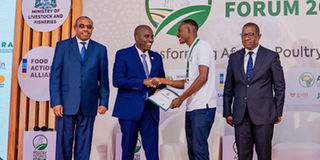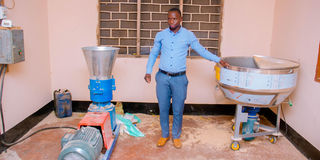From Coop to Capital: How poultry is powering Tanga’s youth-led revival

Deputy Prime Minister and Minister for Energy, Dr Dotto Biteko (second left) hands over a Certificate of Recognition to Omary Mhina (second right) as a young poultry innovator at the Poultry Future Forum 2024. Mhina is one of the cohorts of the Empowering of Youth in the Poultry Value Chain Project under TangaYetu Programme.
In the narrow lanes of Tanga City, where chickens once wandered through family compounds as a sign of subsistence, a quiet revolution is underway.
What was once a casual tradition is now a burgeoning industry led not by corporations, but by young people. At the heart of this transformation are two names: Omari Mussa Mhina and Paul Divason Skombe.
Both are products of the TangaYetu Programme, an ambitious city-wide initiative supported by Fondation Botnar which aims to facilitate social, economic, and technological change that would improve the wellbeing of the youth in Tanga City.
Through the poultry value chain project, these young men have turned lessons into livelihoods and their journeys show what’s possible when empowerment meets opportunity.
Dreams caged by circumstance
Before the programme, Omari faced a familiar Tanzanian reality—uncertain employment and limited prospects. Though chickens were part of his daily life, they held little economic meaning.
“Before, it was just about letting them roam free,” Omari recalled. “I never saw chickens as anything beyond that.”
For his part, Skombe had the drive but lacked the direction. As a youth leader in Tanga, he wanted to create something meaningful, but struggled to find the right path.
“I had ideas, but nothing concrete. I wanted to build something with others, but we didn’t know how to start,” he said.
For both, poultry was a background feature of life. What they needed was the structure to transform familiarity into opportunity.
Training the next generation of poultry entrepreneurs
In 2023, both Omari and Skombe enrolled in the Empowering Youth in Poultry Value Chain Project under TangaYetu, facilitated by AKM Glitters Company Ltd.
The Programme trained 49 youths in entrepreneurship, poultry housing, chicken care, and business development. Participants also received mentorship and farm inputs to launch or scale their businesses.
Omari, mentored by poultry expert Elizabeth Swai, learned systematic farming, disease control, breed-specific care, and enterprise planning. He began with 500 chickens. Within a year, he expanded to over 4,000 broilers and hybrids. His mindset had shifted.
“Thanks to TangaYetu, I now see poultry farming as a real business, not just a custom,” he said. “My goal is to inspire others in Tanga to view poultry as a serious income source.”
Skombe used his training to form the Unity Youth Group, gathering motivated peers to launch a group enterprise. They started with 400 chicks, then expanded to 500, then 600. They reinvested all profits—focusing on building sustainability, not short-term gains.
“We didn’t take profits at first,” said Skombe. “Instead, we reinvested everything into growing the business, knowing every increase in production would strengthen our group.”
Their growth revealed a key bottleneck: access to quality chicks. With support from TangaYetu, Paul proposed a local hatchery.
“We’re hopeful we’ll be producing our own chicks locally,” he said. “This will help not just our business, but the whole community.”
From survival to scale
Today, both young men are not just poultry farmers—they’re mentors, innovators, and employers.
Omari’s business success led him to launch Kuku Pesa Investment Group, a youth-led training and support initiative. Through it, he has trained over 118 young people and supported nearly 100 poultry farmers regionally.
“Most households in Tanzania keep chickens, but it’s rarely seen as a source of income,” Omari explained. “We’re proving that it can be a career.”
In October 2024, Omari was recognized at the Poultry Futures Forum in Dar es Salaam, where he was awarded as a top young poultry innovator by Tanzania’s Deputy Prime Minister.
Meanwhile, Unity Youth Group—under Skombe’s leadership—has expanded its operations to Msambweni, where they now run a secondary site with a hatchery and feed production unit. This allows them to reduce costs and ensure feed quality.

Paul Divason, a cohort of the Empowering Youth in the Poultry Value Chain Project under TangaYetu Programme, pictured next to his poulty feed pellet machines.
“Producing our feed has made a big difference,” Skombe said, adding, “Every savings goes back into improving quality and capacity.”
The Unity Youth Group now employs other young people and trains aspiring farmers. In a recent session, they trained 25 youth and hired three of them. Others started their own ventures.
“We’re not just growing our business,” said Skombe, adding, “We’re empowering others to create their own paths.”
A model for sustainable youth empowerment
The impact of the poultry project in Tanga extends far beyond profit. It’s about shifting perceptions—from poultry as domestic filler to poultry as enterprise. It’s about replacing joblessness with ownership, and dependence with networks of shared growth.
TangaYetu’s integrated model—combining training, funding, mentorship, and youth organizing—has already enabled three businesses, trained dozens of new keepers, and seeded a Sh 40 million revolving fund. Its young leaders are being considered for local government loans and are now contributing to regional food security and economic resilience. But the journey is far from over.
Skombe envisions a future where the “Unity Youth Group” becomes a household name for poultry in Tanga. Omari sees an entire industry transformed.
“Let’s make poultry farming a serious, profitable industry, not just a household tradition,” Omari declared.
Their stories show what development looks like when driven from the ground up. They are not beneficiaries. They are architects.
“The training from TangaYetu has shaped who we are today,” Skombe said. “We’re not just poultry farmers; we’re confident, capable young entrepreneurs ready to lead the way in our community,” he added.
Development doesn’t always require complex infrastructure. Sometimes, it starts with a chick. Sometimes, with a savings group. Sometimes, with belief.
TangaYetu has done more than teaching young people to farm—it has taught them to dream of enterprises, to lead by example, and to lift others as they rise.
And maybe that’s the biggest transformation of all: a city where youths no longer ask for permission to grow, because they’ve already started building the future they want.
TangaYetu initiative is funded by Fondation Botnar and managed by INNOVEX Development Consulting Limited in collaboration with Tanga City Council making Tanga a city where youth thrive.


